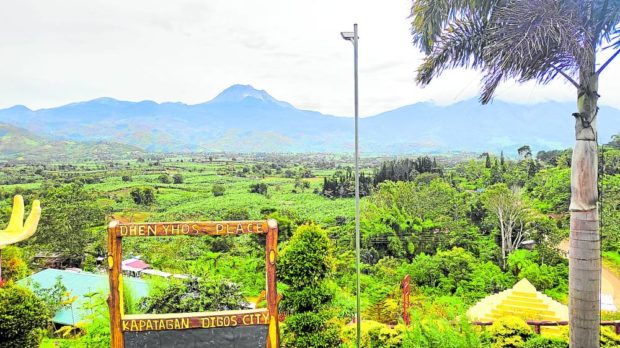
FILE PHOTO: One of the resorts in Kapatagan village, in this January 25, 2023, photo, offers a scenic view of Mt. Apo, the country’s highest peak, a key attraction that lures tourists to the area. —ELDIE AGUIRRE
MANILA, Philippines – Department of Environment and Natural Resources (DENR) officials were quizzed on Wednesday regarding alleged irregularities in the construction of illegal structures within protected areas of Mt. Apo.
In a hearing. Senators Cynthia Villar, Nancy Binay, and Raffy Tulfo sought answers on why the DENR allowed sari-sari stores, schools, gyms, churches, and private resorts, among others there.
According to Tulfo, only a few of the more than 90 structures within Mt. Apo’s protected area have an Environmental Compliance Certificate (ECC).
But DENR Region XI Executive Director Ma. Mercedes Dumagan said: “May ECC na po ang iba (Others already have ECC).”
READ: Mt. Apo Natural Park to stay closed until April 30, says DENR
Explaining that of all the structures, “34 have Protected Area Management Board (PAMB) clearance and no ECC” while “53 are without PAMB clearance and with no ECC.”
Tulfo, however, maintained that structures without ECCs should not have been built in Mt. Apo.
“In the first place hindi ninyo sana pinayagan ‘yun na makapag patayo ‘yan. Kanina pa paulit-ulit, kailangan permit muna bago structure. Dito ang nangyari structure muna bago permit tapos in process pa ‘yung permit,” said Tulfo.
(In the first place you should not have allowed it to build. We have been repeating it that there must be a permit first before the structure. What happened here was the structure was built first before the permit, then the permit is still in process.)
Mt. Apo as ‘multiple use’ zone
Villar and Binay, on the other hand, grilled DENR officials on why most of Mt. Apo was declared as a “multiple use zone.”
Villar pointed out that the structures in question were built in the multiple use zone.
READ: Mt, Apo illegal structures discovered
“Dito sa binigay mong hectarage, ang buffer zone ay 6,000 [hectares], ang multiple use zone ay 24,000 [hectares], ang strict protected zone is 30,000 [hectares]. Ang laki ng multiple use zone. ‘Yan ang tinayuan ng [structures]. Bakit ang laki? Bakit ninyo pa dineclare na protected area kung multiple use zone lang ‘yun? Magkasing laki sila halos,” said Villar.
(Here in the hectarage you presented, the buffer zone is 6,000 hectares, multiple use zone is 24,000 hectares, while the strict protected zone is 30,000. The multiple use zone is so big. This is where the structures are being built. Why is it so big? Why did you declare this as a protected area when most of it will only be categorized as a multiple use zone?)
Binay seconded Villar’s query.
To this, Biodiversity Management Bureau Officer in Charge Director Marcial Amaro Jr. explained that “there is no specific provision under existing guidelines on what will be the percentage of the multiple use zone and the strict protection zone.”
But who issued the permits?
Later into the hearing, Villar asked who authorized the issuance of permits that the structures supposedly have.
“For the PAMB clearance it was the PAMB. For the ECC, it was the [Environmental Management Bureau],” said DENR Regional Executive Director Dumagan.
Environment Secretary Maria Yulo-Loyzaga then interjected, explaining that the issuance of permits to the structures are “already ongoing before [her] administration.”
Tulfo, however, slammed the DENR chief for seemingly pointing fingers.
Still, Yulo-Loyzaga emphasized that, “I am not blaming anyone. I am acknowledging the facts as they are on the ground when I assumed office.”
“This is why I have begun to institute these investigations and suspended the power of the region to actually issue ECCs,” the DENR official said.
“We are being very careful as far as establishing whose responsibility and authorities were put in line during the process of the construction of these particular structures. We cannot just point fingers – we have to acknowledge that the investigation, the evidence need to be quite thorough,” Yulo-Loyzaga further said.
Mt. Apo stands at 2,954 meters above sea level. It is a favorite destination of mountaineers, especially during summer.
Mt. Apo can be reached through six trails starting from Kidapawan, Makilala, and Magpet in Cotabato province and Digos, Sta. Cruz, and Bansalan in Davao del Sur province.